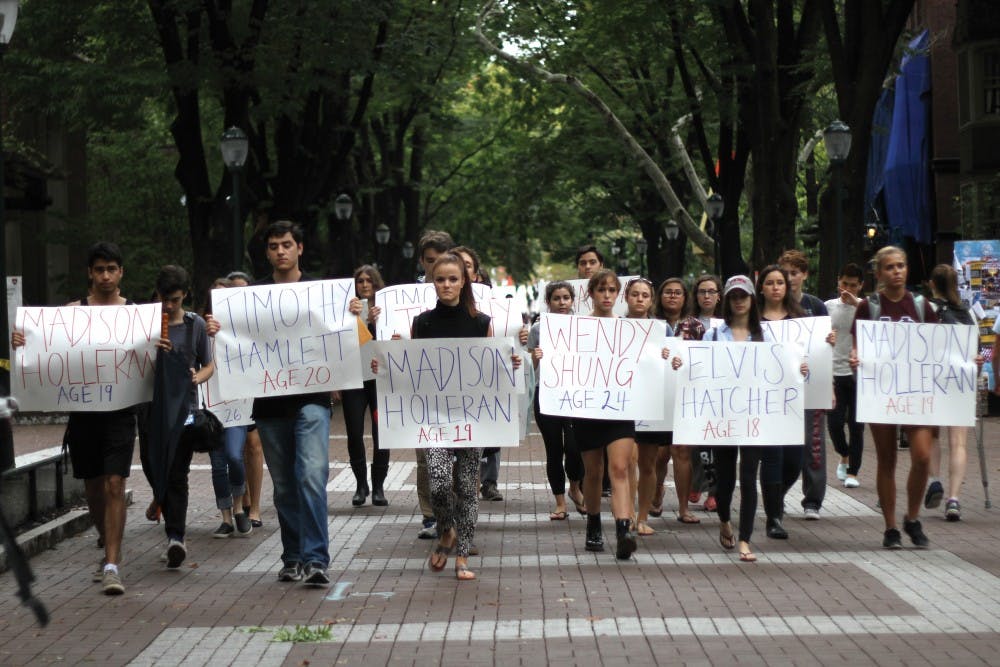
Penn's administration has responded to an open letter from the Hamlett-Reed Mental Health Initiative that was delivered to Penn President Amy Gutmann last week by a group of Penn students.
Credit: Ilana Wurman , Ilana Wurman, Ilana WurmanOn Friday morning, members of the Hamlett-Reed Mental Health Initiative met with administrators to discuss last week's open letter to President Gutmann. The meeting included Vice Provost for University Life Valarie Swain-Cade McCoullum, Vice Provost for Education Beth Winkelstein, and Counseling and Psychological Services Director Bill Alexander, among others.
The letter, which urged President Gutmann and the administration to reform efforts in protection of student mental health, was signed by family members and friends of Penn students who died by suicide as well as student leaders from mental health advocacy groups, student government, minority councils and Greek organizations.
During the meeting, administrators and students discussed each of the letter's six proposals, reaching agreements on how to address mental health issues in the future.
1. Designated Counselor
The Initiative requested that students be assigned specific wellness counselors who will appear alongside academic advisors on PennInTouch and will arrange individual meetings with students throughout the year.
Administrators agreed to research a pilot program for incoming freshmen that involves specific wellness advisors. Members of the Initiative will be updated on the progress of the research at the end of this semester.
2. Anonymous Visits
The Initiative's second proposal asked for anonymity in scheduling initial CAPS visits, suggesting a system in which students can use anonymous IDs to schedule their first appointments.
Administrators did not agree to the proposal, explaining that anonymity would conflict with the overall goal of a therapeutic relationship between student and counselor.
3. Online Scheduling
The Initiative asked CAPS to adjust its appointment scheduling system so visits can be scheduled online as well as over the phone.
Administrators agreed to review the scheduling process, with a promised update by the end of this semester.
4. Ongoing, Proactive Communication
The Initiative requested that CAPS reach out to students once a month via a newsletter to provide updates and information about mental health issues.
Administrators did not agree to email students, citing existing means of communication, such as the forthcoming student wellness app.
5. CAPS Best Practices
The Initiative requested that the University monitor students with specific stress factors, such as athletes, and that deliberations and policies on this matter be open to the public. The Initiative also asked that students who take leaves of absences for mental health reasons not be penalized in any way.
Administrators discussed the recent launch of the Jed and Clinton Campus Program advisory team to oversee the University's mental health initiatives and agreed to maintain transparency, but did not address the Initiative's suggestion to keep track of students with specific stress factors. Administrators also committed to reviewing leave-of-absence policies, but did not promise to unify leave-of-absence policies across schools.
6. New Student Orientation Events
The Initiative's final proposal requested an NSO event dedicated to mental health, as well as a separate meeting for parents to educate them about mental health resources on campus.
Administrators did not agree to create a new NSO event, but agreed to develop a virtual CAPS introduction for incoming freshmen by NSO 2016. Administrators will continue to evaluate NSO programs for both students and parents, with an update at the beginning of next semester.
The Daily Pennsylvanian is an independent, student-run newspaper. Please consider making a donation to support the coverage that shapes the University. Your generosity ensures a future of strong journalism at Penn.
DonatePlease note All comments are eligible for publication in The Daily Pennsylvanian.





